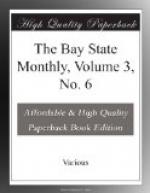This extract reveals how deeply the anomaly of Mormon life had at once impressed her. Miss Field was too keen and cultivated an observer not to see beneath the surface of this phase of living a problem whose roots struck deep into national prosperity and safety. The distinguished essayist and critic, Mr. Edwin P. Whipple, said of her study of Mormonism:—
She undertook a perfectly original method of arriving at the truth, by intimate conversations with Mormon husbands and wives, as well as with the most intelligent of the “Gentiles.” She discarded from her mind pre-conceptions and all prejudices which discolor and distort objects which should be rigidly investigated, and looked at the mass of facts before her in what Bacon calls “dry light.” Cornelius Vanderbilt, the elder, was accustomed to account for the failures and ruin of the brilliant young brokers who tried to corner the stocks in which he had an interest, by declaring that “these dashing young fellars didn’t see things as they be.” Miss Field saw things in Utah “as they be.” She collected facts of personal observation, analyzed and generalized them, and, by degrees, her sight became insight, and the passage from insight to foresight is rapid. After thorough investigation, her insight enabled her to penetrate into the secret of that “mystery of iniquity” which Mormonism really is; while her foresight showed her what would be the inevitable result of the growth and diffusion of such a horrible creed.
The winter lapsed into spring and still she lingered in Salt Lake City. She relinquished all pleasure for the real work of studying deeply the anomaly of a Polygamous hierarchy thriving in the heart of the Republic. Every facility was accorded to her by United States officials, military officers, leading Gentiles and Apostates. Prominent “Latter Day Saints” offered her marked courtesy. She pursued this research unremittingly for eight months and when, at last, she left Salt Lake City, the leading Gentile paper, the Tribune, devoted a leading editorial to Miss Field’s marvellously thorough study of Mormon conditions, and, on her departure, said:—




